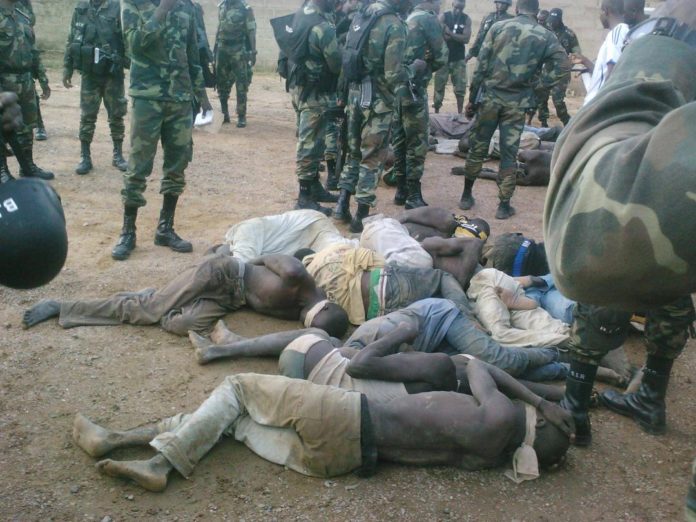Renowned global human rights non-governmental organization, Amnesty International, has mounted fresh pressure on the government of Cameroon, calling on authorities to provide answers to the whereabouts of some 130 men and boys.
Amnesty International says the men and boys remain unaccounted since 27 December 2014 after they were arrested in a crackdown on suspected Boko Haram members.
On 10 March 2020, the rights group launched a new campaign: “Where are they? Accountability for victims of human rights violations in the villages of Magdémé and Doublé in Cameroon’s Far-North.” According to Amnesty International, the advocacy campaign seeks to put pressure on the Biya government to provide answers for the families of those who are missing. The UK-based NGO also wants the security forces who committed human rights abuses during the raid and subsequent enforced disappearances to be punished.
Samira Daoud, Amnesty International West and Central Africa Regional Director, said in the last five years, life has been on hold for the relatives of the men and boys who disappeared. “We want to show them that they have not been forgotten, and that we will continue to pressure the Cameroonian authorities until the truth is uncovered for each one of the 130 men and boy.”
Amnesty International considers that the government’s continuous failure to disclose their whereabouts adds insult to injury to the families who have already waited a long time for news of their loved ones. The right group insists the country must stop using its fight against Boko Haram to justify its blatant violations of human rights.
The missing men and boys were among more than 200 arrested during a cordon-and-search operation in the villages of Magdeme and Doublé in the Far North region. Of those arrested, at least 25 are said to have died in custody on the night of the arrests, with another 45 transferred to Maroua prison the day after, while three later died due to dire conditions in detention. Amnesty International reported back then that Cameroon security forces also unlawfully killed at least nine civilians, including a child, and destroyed more than 70 homes and looted buildings.
To Amnesty International, the 130 people, who were arrested and are still missing, are victims of enforced disappearance; a crime under international law.
Yaounde’s Reaction
The government of 87-year old President Paul Biya, who have been in power since 1982, has yet to officially react to the latest campaign initiated by Amnesty International.
However, in September 2015, Issa Tchiroma Bakary, the then Minister of Communication (who is still in government in a different capacity), noted that, faced with repeated attacks of Boko Haram, administrative authorities and the high military command ordered a series of mass screening operations and cordon-search raids in roads across localities affected by the said attacks. The operations focused along the National Road No. 1 between the towns of Mora and Kousseri, with special emphasis on Mademe and Doublé localities.

Back then, Tchiroma said: “These search operations led to the arrest of seventy suspects, who were further transferred to the Maroua Gendarmerie Legion for thorough investigation.
“Fourteen people among the arrested were then led to the cells of the Maroua Territorial Brigade, whereas the others, fifty-six in number, were kept in custody in a place designed especially for that purpose at the Gendarmerie Legion, because all the cells of the Gendarmerie, as well as the Maroua central prison, were already congested.
“On early December 28, 2014, after opening the premises where the suspects were kept the day before at the Gendarmerie Legion, it was noticed that twenty-five suspects were dead.
“A forensic doctor then carried out autopsies on the mortal remains before ordering their burial. According to the forensic reports subsequently issued, the deceased died following, and I quote: ‘a collective chemical intoxication after ingesting unidentified chemical and traditional products, with quick organic cytolysis,’ end of quote. Let me indicate that in the medical field, cytolysis means the dissolution or destruction of cells, which can occur, among other reasons, after drug intoxication.”
Rights Violation

The government of Cameroon has often denied accusations of wrongdoing by its armed forces, especially the elite Rapid Intervention Battalion (BIR) which is combatting Boko Haram insurgents in the north.
On 9 March 2020, Paul Atanga Nji, Minister of Territorial Administration, accused some NGOs, including Amnesty International and Human Rights Watch, of proving themselves to be enemies of the state of Cameroon by propagating false information on the management of the Anglophone conflict. He claimed the organizations had received FCFA 5 billion from dubious networks within and outside Cameroon to destabilize state institutions.
In 2018, a video emerged of men dressed in Cameroonian military fatigues executing two women and two children. The extra-judicial killing sparked national and global outrage. The government initially categorically denied the involvement of its troops. But later, seven soldiers were arrested in connection to the killings.
Cameroon is rated Not Free in Freedom in the World, Freedom House’s annual study of political rights and civil liberties worldwide.

